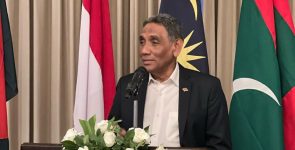
State Electric Company (STELCO) and Maldives National University (MNU) have inked an agreement to conduct an academic study investigating the surge in electricity bills. The signing ceremony saw STELCO’s Managing Director, Hussain Fahumy, and MNU’s Vice Chancellor, Dr Aishath Shehenaz Adam, formally commit to the collaborative research.
Per the agreement, the study will scrutinise all electric bills issued by STELCO since 2014. This extensive analysis aims to address the growing public concern over increasing electricity costs.
Speaking at the event, Fahumy highlighted the diverse opinions surrounding the electric bills and emphasised the need for an impartial, academic examination. “In order to facilitate this, we will, without any reservations, provide all information we can and give access to our systems. There will be no limits in this. We will provide all resources,” he assured. Fahumy also called for the study to be conducted transparently, with findings revealed to the public.
Dr Shehenaz outlined the primary goals of the research, noting that it would not only contribute to academic knowledge in the field of electricity but also provide higher education and internship opportunities.
Key focus areas of the study include:
• Analysing electricity consumption levels at various times of the day
• Investigating the seasonal relationship with electricity usage
• Examining the authenticity of STELCO’s billing process and exploring ways to enhance transparency
• Checking for discrepancies between electric meter readings and billed amounts
• Verifying bill calculations and identifying any inconsistencies
Additionally, the research will explore methods to economise electricity usage and pinpoint areas for reducing consumption.
This initiative comes in response to mounting public criticism of STELCO over rising electricity bills. Just last month, social media was abuzz with concerns from numerous residents.
STELCO currently supplies electricity to over 70,000 households in the Malé area, with power demand peaking at 100 megawatts during peak hours. This year, peak demand soared to 113 megawatts. In response, STELCO has announced plans to conduct household audits to tackle the issue.
Electricity consumption has been rising steadily by about 8 to 10 percent annually, according to STELCO. Based on current trends, they project that peak hour demand could escalate to 120 megawatts within the next year.
As the study progresses, the findings are expected to shed light on the factors driving up electricity bills and suggest potential measures for alleviating the financial burden on households.









